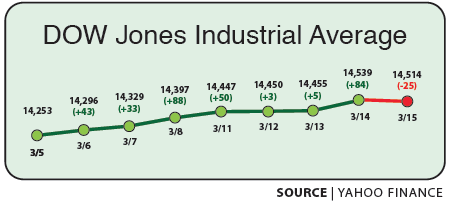Dow benefits for university hazy

March 16, 2013
Recent economic signs may point to a brighter future for the nation and Illinois.
The Dow Jones Industrial, a stock market index, ended its 10-day gain streak Friday for the first time since November 1996, which was followed by a 19 percent market increase a year later. The streak came as a shock because the Dow has only risen nine or more straight days 42 times in its 117- year existence, according to Standard & Poor’s Dow Jones Indices.
As the economy mends, several experts weighed in on how the recent Dow streak could have impacts on the country, the state and possibly the university.
Advertisement
David Yepsen, Paul Simon Public Policy Institute director, said the market increase can’t be attributed to the president’s administration or any other one source.
“It is very hard to say,” he said. “You can’t say a boost in the stock market is anybody’s responsibility or any one thing. There are a lot of factors that have gone into this, so I wouldn’t say it’s just only one thing.”
Yepsen said several market turnaround components include increased market investments and Federal Reserve policies established over the past several years to stimulate the economy.
While the economy is showing signs of strength, recovery has been slow. The U.S.’s Gross Domestic Product, the market value of all officially recognized final goods and services produced within a country in a set period of time, grew 0.1 percent during the last financial quarter.
While employment has risen, the unemployment rate is still 7.7 percent, compared to less than 6 percent throughout the late ’90s until the 2008 financial crisis.
Despite the economic upturn, expertsaresplitonhowthenational improvements may affect the state.
Yepsen said the country’s financial situation can directly impact states, and the country is on its way to recovery.
Advertisement*
“Yes (it can affect the state), and it is,” he said. “State revenue taxes are growing, they did. The recovery is slow, nationally and here in Illinois, but there is economic evidence of a recovery.”
Champaign-Urbana’s Institute of Government and Public Affairs releases a monthly flash index that factors the weighted average of growth rates in corporate earnings, consumer spending and personal income to measure Illinois economic activity. Averages higher than 100 on the chart show possible state economic growth. Since January 2011, the index has raised from nearly 96 to 104.9 this January with only small decreases.
However, university President Glenn Poshard said he doesn’t think the Dow increases will help the state financially.
“I don’t think that the Dow, given the financial shape the state is in, with acting funds to pay state bills … (will help) the state that much,” he said.
Poshard said the Dow will cause individuals and businesses to spend more and help the state collect more revenue from sales taxes, but he doesn’t think the improvement will have any direct state impact.
While the nation and state are showing improvement signs, several officials said the university probably won’t see benefits.
Poshard said the Dow does not affect the university because it is not allowed to invest in the stock market and can only invest in government securities, bonds or debt obligations issued by a government authority with an eventual repayment promise backed by the government.
“As we have a daily balance of money, those are invested in very short-term securities because our cash flow runs from one month to the next,” he said. “So any longer- term strategies for investing, we’re precluded from doing that except in the most conservative ways.”
Poshard said while the economy wouldn’t affect the university directly, it could cause enrollment to increase because more families could afford tuition.
Yepsen said although it is good Illinois could see increased tax revenue, it is not much and there are other priorities likely to receive funds before the university.
“I doubt it will have much of an impact,” he said. “The reason I say that is the priority in Springfield is to pay back due bills and fix the pension system, and additional dollars for anything else are a lower priority.”
While experts are optimistic, some students don’t believe the economy will affect them or show more improvement signs.
Louis Ackah, a graduate student in civil engineering from Ghana, said although the economy has improved, he thinks the country is still stuck in a recession.
“It kind of goes with unemployment and the cost of living,” he said.
Caleb McCluskey, a senior from Hurst studying marketing, said even though the Dow had a hot streak, he does not think it is a sign of overall economic improvement.
“I think that we’re going to do a little bit better for a little bit, and then we’re just going to have the same problems we’ve always had and drop down or worse,” he said.
Advertisement







